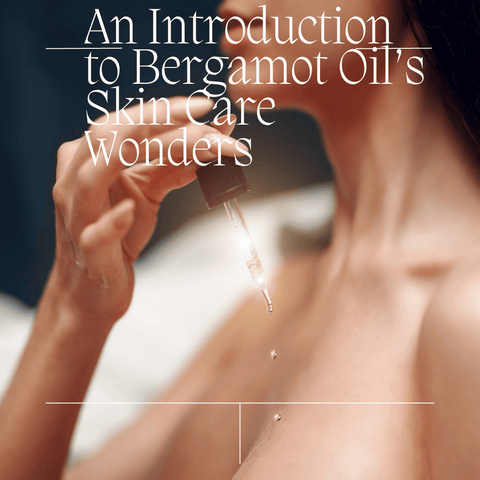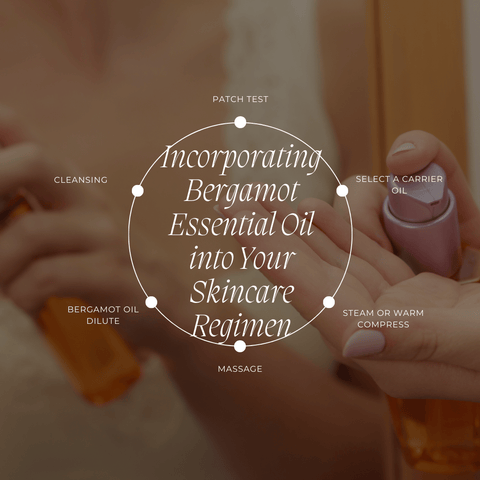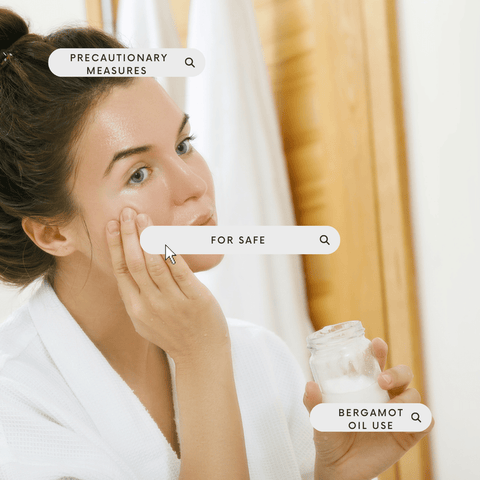It is true that bergamot essential oil, which is extracted from the citrus fruit Citrus bergamia, is a miraculous and multipurpose oil that has many uses for your skin. This blog explains how bergamot essential oil can give you radiant, healthy skin.
An Introduction to Bergamot Oil’s Skin Care Wonders

A multipurpose oil with exceptional skin care properties, bergamot essential oil is made from the rind of the citrus bergamia fruit. It is a well-liked ingredient in natural skincare regimens since it provides a wide range of benefits for your skin. Here is a brief overview of the benefits of bergamot oil for skin care, including its antiseptic properties, skin balancing abilities, ability to reduce scars and blemishes, anti-inflammatory properties, antioxidant protection, ability to improve skin tone, ability to reduce stress, caution when using it in the sun, and importance of quality. It can assist you in achieving radiant, healthy skin when used carefully and with the required safety measures.
What Makes Bergamot Oil Unique?
Bergamot essential oil is unique and distinct from essential oils due to its origins, fragrance, and diverse uses. Some factors that make bergamot oil stand out are its unique source, signature fragrance, versatility in perfumery, unique flavor, therapeutic properties, skin benefits, anti-inflammatory and antioxidant benefits, caution with sun sensitivity, and unique chemical composition. However, it's important to use it mindfully, especially about sun sensitivity and potential skin sensitivities.
Key Benefits of Bergamot Oil for Skin
Bergamot essential oil has a number of skin benefits, making it a popular choice in natural skincare. The following are the primary advantages of using bergamot oil for skin:
-
Antiseptic Properties: Bergamot oil contains natural antiseptic properties that make it useful for preventing and treating skin infections. It can aid in skin disinfection, preventing the growth of acne-causing bacteria and lowering the risk of breakouts.
-
Skin Balancing: Bergamot oil balances sebum production in the skin, making it suitable for all skin types. It can help keep your skin hydrated by reducing excess oiliness in oily skin and preventing dryness in dry skin.
-
Scar and Blemish Removal: Bergamot essential oil stimulates skin cell regeneration, which aids in the removal of scars and blemishes. Regular application can result in a more even complexion and a reduction in the visibility of scars.
-
Anti-Inflammatory Effects: Bergamot oil contains anti-inflammatory compounds that can reduce redness and inflammation associated with a variety of skin conditions, including acne and skin irritations.
-
Antioxidant Protection: Bergamot oil is high in antioxidants, which protect your skin from free radical damage, which is a leading cause of premature aging. Antioxidants can aid in the maintenance of a youthful and radiant complexion.
-
Improved Skin Tone: By reducing the appearance of pigmentation and dark spots, bergamot oil can promote a more even skin tone. This results in a brighter, healthier-looking complexion.
-
Relaxation and Stress Reduction: Bergamot oil has aromatherapy benefits due to its pleasant, citrusy scent. It can help reduce stress and anxiety, which can improve your skin's health. Stress is frequently a factor in skin problems such as acne and premature aging.
-
Caution with Sun Exposure: Bergamot oil is phototoxic, which means it can make your skin more sensitive to the sun. When applying bergamot oil topically, avoid direct sunlight for at least 12 hours or use sunscreen to protect your skin.
-
Dilution and Patch Testing: Always dilute bergamot oil with a carrier oil (e.g., jojoba or almond oil) before applying it topically to avoid skin irritation. Before using it on your face, conduct a patch test on a small area of skin to check for sensitivities.
-
Quality Matters: To ensure safety and efficacy, use high-quality, pure bergamot essential oil from reputable brands.
By incorporating bergamot oil into your skincare routine, you can reap the benefits of its soothing, anti-inflammatory, and healing properties, which will help you achieve a healthier, more radiant complexion.
Navigating Through Bergamot Oil’s Skin-Enhancing Features

Bergamot essential oil is a useful addition to your skincare regimen because it has a number of skin-improving properties. Here is a guide to help you understand the bergamot oil's skin-improving properties, including its antiseptic and antibacterial properties, skin balancing properties, benefits for reducing scars and blemishes, anti-inflammatory properties, antioxidant protection, improved skin tone, relaxation and stress reduction potential, dilution and patch testing, and quality considerations. You may take advantage of bergamot oil's calming, healing, and rejuvenating properties on your skin by understanding these benefits for the skin and applying them carefully in your skincare regimen.
Tackling Acne and Blemishes with Bergamot Oil
Bergamot essential oil can be a useful natural treatment for acne and blemishes. It is a beneficial addition to your skincare regimen if you want to fight acne because of its antibacterial, anti-inflammatory, and skin-balancing qualities. Here is how to use bergamot oil to treat pimples and acne:
-
Dilution: Bergamot oil should always be diluted with carrier oil to avoid skin irritation. Several drops of bergamot oil should be combined with a carrier oil, such as jojoba, almond, or coconut oil. A general rule of thumb is to use approximately 2-3 drops of essential oil per teaspoon of carrier oil.
-
Patch Test: Perform a patch test by applying diluted bergamot oil to a small area of skin to check for sensitivities or adverse reactions.
-
Cleansing: Begin by cleansing your face with a gentle cleanser to remove dirt, excess oil, and impurities.
-
Steam or Warm Compress: Use a warm compress or steam on your face to open up the pores and allow the bergamot oil to penetrate the skin.
-
Spot Treatment: Dab blemishes or acne spots with a cotton swab or clean fingertip dipped in diluted bergamot oil. Use it sparingly on your face, especially if you have sensitive skin.
-
Massage: Apply the diluted bergamot oil to your face, concentrating on acne-prone areas. Be gentle and avoid vigorous rubbing, as this can irritate the skin.
-
Leave-On or Rinse Off: You can apply the diluted bergamot oil to your skin overnight or rinse it off after a few hours. If you have sensitive skin, rinse it off to reduce the risk of skin irritation.
-
Sun Protection: Bergamot oil is phototoxic, so if you use it during the day, apply sunscreen with adequate sun protection (SPF 30 or higher) to protect your skin from increased sensitivity to UV rays.
-
Consistency: Maintaining consistency is essential in the treatment of acne and blemishes. For best results, incorporate bergamot oil into your skincare routine on a regular basis.
-
Caution: If you notice any skin irritation, redness, or discomfort, stop using it right away. Some people are more sensitive to bergamot oil, so use it with caution.
It is important to remember that everyone's skin is different, and what works for one person may not work for another. If you have persistent or severe acne, see a dermatologist for a customised treatment plan. Bergamot oil can be an effective complementary acne treatment, but it should be used with caution and in conjunction with other skincare practises for the best results.
Using Bergamot Oil for a Brightening Effect
Because of its ability to encourage an even skin tone and lessen the appearance of pigmentation and dark spots, bergamot essential oil can help brighten your skin and improve its general complexion. Here are some tips for using bergamot oil to get a brightening effect: diluting, conducting a patch test, washing, applying a warm compress or steam, massaging, leaving it on or rinsing it off, using consistency, and exercising caution. Consider seeking the advice and treatment options of a dermatologist for more difficult or severe skin problems. When used consistently and with caution, bergamot oil can be a useful supplement to your skincare regimen.
Incorporating Bergamot Essential Oil into Your Skincare Regimen

Including bergamot essential oil in your skincare routine can improve your skin in a variety of ways. Here a step-by-step instructions on how to do it, including the use of a patch test, a carrier oil selection, washing, steam or warm compresses, dilution of the bergamot oil, massage, leave-on or rinse-off applications, sun protection, caution, and dermatological consultation. You can benefit from the benefits of this oil for your skin by including bergamot essential oil in your skincare routine and by following these instructions. However, to achieve the greatest outcomes and reduce the possibility of negative responses, always use caution, especially when it comes to sun exposure and potential skin sensitivities.
Easy Steps to Apply Bergamot Oil for Optimal Results
Applying bergamot oil to your skincare routine for optimal results is simple if you follow these steps:
-
Patch Test: Perform a patch test before applying bergamot essential oil to your face to check for sensitivities or allergies. Wait 24 hours after applying a small amount of diluted bergamot oil to a small area of skin, such as the inside of your wrist, to ensure there are no adverse reactions.
-
Select a Carrier Oil: Before applying bergamot essential oil, it should always be diluted with a carrier oil. Choose a carrier oil that is appropriate for your skin type, such as jojoba, almond, or coconut oil.
-
Cleansing: Begin by cleansing your face with a gentle cleanser to remove dirt, makeup, and impurities.
-
Steam or Warm Compress: Use a warm compress or steam your face to open up your pores and prepare your skin for the application of bergamot oil.
-
Bergamot Oil Dilute: Combine a few drops of bergamot essential oil with a carrier oil. The general rule of thumb is to use about 2-3 drops of essential oil per teaspoon of carrier oil.
-
Massage: Using your fingertips, gently massage the diluted bergamot oil into your face. Avoid any open wounds, cuts, or active acne lesions in the area around the eyes.
-
Leave-On or Rinse-Off: You have the option of leaving the diluted bergamot oil on your skin overnight or rinsing it off after a few hours. Leaving it on overnight allows the oil to do its work on your skin while you sleep.
-
Sun Protection: If you use bergamot oil during the day, apply sunscreen with adequate sun protection (SPF 30 or higher) to protect your skin from increased sensitivity to UV rays.
-
Consistency: For the best results, incorporate bergamot oil into your skincare routine on a regular basis. It may take several weeks to notice significant improvements in your skin.
By following these simple steps, you can incorporate bergamot oil into your skincare routine for optimal results. Bergamot oil can provide a variety of skin benefits, but it is important to use caution, especially when it comes to sun exposure and potential skin sensitivities, to get the best results and reduce the risk of adverse reactions.
Expert Tips: Mixing Bergamot Oil with Other Skincare Products
By combining bergamot essential oil with other skincare products, you can benefit from and complete your skincare routine. Here are some tips from experts in the field on mixing bergamot oil with other skincare products:
-
Carrier Oils: Bergamot oil can be diluted using jojoba, almond, or coconut oil, as well as other types of carrier oils. These oils help dilution of the essential oil while also providing their own skin-nourishing properties.
-
Moisturisers: Add a few drops of bergamot oil to your typical moisturiser. This might boost the moisturizer's effectiveness and provide additional skin-balancing benefits.
-
Serums: Add bergamot oil to your preferred serum to enhance its properties. This combination can aid in the treatment of specific skin issues such as acne and pigmentation.
-
Facial Masks: Bergamot oil can be added to homemade or store-bought face masks. It can provide a calming and clarifying effect when used in this way.
-
Cleansers: Add a drop of bergamot oil to your face wash. This also helps to enhance the cleaning process and has antiseptic benefits.
-
Aromatherapy Diffuser: Use an essential oil diffuser to spread the scent of bergamot oil throughout your skincare area. This may help you relax and reduce stress, which is beneficial to your skin.
-
Sunscreen: Before applying sunscreen, massage bergamot oil into your skin with a carrier oil. This can boost antioxidant protection and improve sun protection for your skin.
-
Custom Blends: Combine bergamot oil with other essential oils known to be beneficial to the skin. Bergamot, for example, is frequently combined with lavender and tea tree oil for a balanced effect.
-
Be Aware of Phototoxicity: Avoid applying bergamot oil directly to your skin before going out in the sun because it is phototoxic. If using it during the day, apply it at least 12 hours before going outside, or wear sunscreen.
-
Begin slowly: When combining bergamot oil with other skincare products, start with a small amount and gradually increase as needed. This allows you to monitor your skin's reaction and avoid irritation.
-
Quality Matters: To ensure its efficacy and safety, use high-quality bergamot oil that is free of synthetic additives or contaminants.
Precautionary Measures for Safe Bergamot Oil Use

Bergamot essential oil should be used with extreme caution in your skincare regimen. The potential phototoxic effects of bergamot oil increase the photosensitivity of your skin. Here are some safety precautions to ensure the use of bergamot oil:
-
Dilution: Always dilute bergamot oil with a suitable carrier oil before applying it to your skin. A typical bergamot oil-to-carrier-oil ratio is 2-3 drops per teaspoon of carrier oil.
-
Patch Test: Perform a patch test on a small area of skin, such as the inside of your wrist, with diluted bergamot oil. Wait 24 hours to see if there are any adverse reactions or sensitivities.
-
Phototoxicity: Avoid applying bergamot oil to your skin before going outside in the sun. If you intend to use it during the day, apply it at least 12 hours before going out in the sun. Apply sunscreen with an SPF of 30 or higher to your skin to protect it from UV rays.
-
Sun Avoidance: Avoid direct sun exposure as much as possible while wearing bergamot oil, especially for the first 12 hours after application.
-
Sensitive Skin: If you have sensitive skin, use bergamot oil with caution and in lower concentrations. Some people are more prone to skin sensitivities than others.
-
Avoid Contact with Eyes: Avoid allowing bergamot oil to come into contact with your eyes. If this occurs, thoroughly rinse your eyes with water.
-
Consult a Dermatologist: Before using bergamot oil on your skin, consult a dermatologist or skincare professional if you have any specific skin conditions, allergies, or concerns.
-
Use With Caution During Pregnancy: Pregnant women should use essential oils, including bergamot, with caution. Consult a healthcare professional before using, and always use with a carrier oil and in small amounts.
-
Quality Matters: Select high-quality, pure bergamot essential oil from reputable brands to ensure it is free of synthetic additives or contaminants.
By taking these precautions, you can safely incorporate bergamot oil into your skincare routine and reap its numerous benefits without risk of adverse reactions or skin sensitivities. Safety and mindfulness are essential when using essential oils, especially those like bergamot that have specific precautions associated with them.
Safety First: Avoiding Bergamot Oil Side Effects
While bergamot essential oil has numerous skincare benefits, it is important to be aware of potential side effects and use caution to avoid adverse reactions. Here are some precautions to take when using bergamot oil to avoid side effects:
-
Dilution: Always dilute bergamot oil with a suitable carrier oil (e.g., jojoba, almond, or coconut oil) before applying it to your skin. The general rule of thumb is to use about 2-3 drops of bergamot oil per teaspoon of carrier oil.
-
Patch Test: Before using bergamot oil on your face or a larger area of your skin, perform a patch test on a small area, such as the inside of your wrist. Wait 24 hours before checking for any negative reactions or sensitivities.
-
Phototoxicity: Bergamot oil is phototoxic, which means it can make your skin more sensitive to UV rays. Avoid applying bergamot oil directly to your skin before going out in the sun. If you intend to use it during the day, apply it at least 12 hours before going out in the sun, and use sunscreen with an SPF of 30 or higher to protect your skin from UV rays.
-
Sun Avoidance: Avoid direct sun exposure as much as possible while wearing bergamot oil, especially for the first 12 hours after application.
-
Sensitive Skin: If you have sensitive skin, dilute bergamot oil or perform a patch test on a sensitive area to ensure it does not irritate it.
-
Eye Contact: Avoid allowing bergamot oil to come into contact with your eyes. If this occurs, thoroughly rinse your eyes with water.
-
Consult a Dermatologist: If you have any specific skin conditions, allergies, or concerns, you should consult a dermatologist or skincare professional before using bergamot oil on your skin.
-
Pregnancy and Children: When using essential oils, including bergamot, pregnant women should exercise caution. Consult a healthcare professional before using, and always use bergamot oil with a carrier oil and in small amounts. Bergamot oil should be used with extreme caution around children.
-
Quality Matters: Select high-quality, pure bergamot essential oil from reputable brands to ensure it is free of synthetic additives or contaminants.
-
Reactions: If you notice any skin irritation, redness, or discomfort, stop using the product right away. Some people are more sensitive to bergamot oil, so use it with caution.
By taking these safety measures, you may lessen the possibility of adverse effects and safely add bergamot essential oil to your skincare regimen to enjoy its advantages without suffering any unwanted consequences. When utilising essential oils, especially those like bergamot that have specific restrictions attached to them, safety and mindfulness are imperative.
Identifying High-Quality Bergamot Essential Oil for Skin Care
To get the full spectrum of advantages and prevent any potential side effects, it's necessary to find high-quality bergamot essential oil for skincare. Some ways to spot a high-quality bergamot essential oil are a pure source and origin; an extraction method; authenticity and purity; a botanical name; testing and transparency; packaging; aroma and scent; a good reputation and reviews; fair pricing; and certificates. Consult a medical expert or aromatherapist for advice if you have any concerns regarding the efficacy or safety of an essential oil product.








































